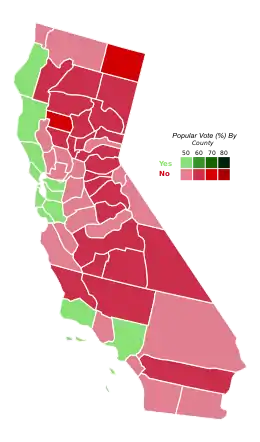2016 California Proposition 61
Proposition 61 was a California ballot proposition that appeared on the November 8, 2016 ballot. It would have prohibited the state of California from buying any prescription drug from a drug manufacturer at price over the lowest price paid for the drug by the United States Department of Veterans Affairs. It would have exempted managed care programs funded through Medi-Cal.[2] According to the fiscal impact statement issued by California Legislative Analyst's Office, "potential for state savings of an unknown amount depending on (1) how the measure’s implementation challenges are addressed and (2) the responses of drug manufacturers regarding the provision and pricing of their drugs." [3]
State Prescription Drug Purchase Standards | ||||||||||||||||||||||
| Results | ||||||||||||||||||||||
|---|---|---|---|---|---|---|---|---|---|---|---|---|---|---|---|---|---|---|---|---|---|---|
| ||||||||||||||||||||||
 Results by county | ||||||||||||||||||||||
| Source: California Secretary of State[1] | ||||||||||||||||||||||
| Elections in California |
|---|
 |
Proposition 61 was rejected by a vote of 47 to 53 percent.[4]
Reactions & Analysis
Individuals
Organizations
Organizations
- California NAACP[10]
- California Medical Association[6]
- Veterans of Foreign Wars, Department of California[11]
- California Taxpayers Association[12]
Parties
Public Opinion
| Poll source | Date(s) administered |
Sample size |
Margin of error |
% support | % opposition | % Undecided/Don't Know |
|---|---|---|---|---|---|---|
| Field/YouGov | October 25–31, 2016 | 998 LV | N/A | 47% | 47% | 6% |
| Hoover Institution/YouGov | October 4–14, 2016 | 1248 LV | ± 3.28% | 51% | 24% | 25% |
| Field/YouGov | September 7–13, 2016 | 943 LV | N/A | 50% | 16% | 34% |
| USC Dornsife/Los Angeles Times[note 1] | September 1–8, 2016 | 1912 RV | ± 3% | 66% | 23% | 12% |
Notes
- Totals do not sum to 100% due to rounding
References
- "Statement of Vote - November 8, 2016, General Election". December 16, 2016. Retrieved January 7, 2017.
- "Proposition 61. California General Election November 8, 2016. Official Voter Information Guide". California Secretary of State. Archived from the original on 15 September 2016. Retrieved 10 October 2016.
- Taylor, Mac; Cohen, Michael. "Fiscal Impact Statement" (PDF). State of California Department of Justice Office of the Attorney General. Retrieved 11 October 2016.
- Sernoffsky, Evan (November 9, 2016). "California voters reject drug-price measure Prop 61". SFGate. Retrieved December 7, 2016.
- Mai-Duc, Christine; Bollag, Sophia (2016-11-07). "Bernie Sanders campaigns for Prop. 61 in California". Los Angeles Times. tronc, Inc. Archived from the original on November 8, 2016.
- Mai-Duc, Christine (2016-11-04). "What you need to know about Prop. 61, the spendy prescription drug measure on November's ballot". Los Angeles Times. tronc, Inc. Archived from the original on November 8, 2016.
- Karlin-Smith, Sarah; Norman, Brett (2016-08-22). "Part D pricing trends". Politico.com. Politico. Archived from the original on August 22, 2016.
- The Communications Committee (2016-09-01). "The Statewide Ballot Measures". Peace and Freedom Party. Archived from the original on November 9, 2016.
- "Progressive Democrats of America". Progressive Democrats of America Facebook page. 2016-10-29. Archived from the original on November 10, 2016.
- Mai-Duc, Christine (2016-10-31). "The Rev. Al Sharpton and civil rights leaders hold rally in support of Proposition 61". The Los Angeles Times. tronc, Inc. Archived from the original on November 1, 2016.
- "We Oppose Proposition 61" (PDF). Veterans of Foreign Wars - Department of California. 2016-07-29. Archived (PDF) from the original on 2016-11-11.
- "Proposition 61: Mandated Cap on Drug Prices" (PDF). California Taxpayers Association. 2016. Archived (PDF) from the original on November 9, 2016.
- "Vote No: Proposition 61". The Republican Party of California. 2016. Archived from the original on November 9, 2016.
- "Measures". Libertarian Party of California. 2016-08-21. Archived from the original on October 21, 2016. Retrieved November 9, 2016.
- "November 8, 2016 Endorsements". Alice B. Toklas LGBT Democratic Club. 2016-08-17. Archived from the original on November 9, 2016.